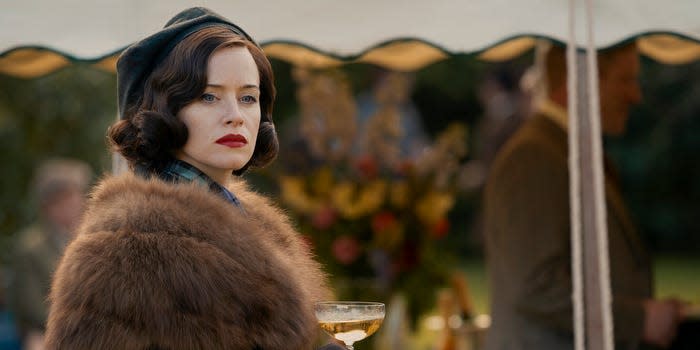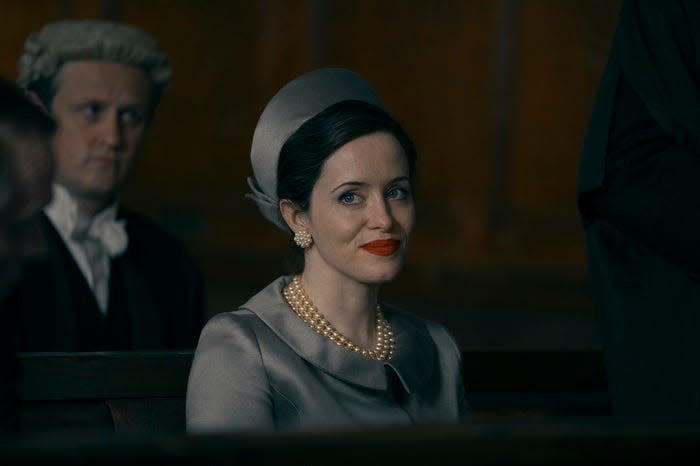How Claire Foy Cracked the Duchess of Argyll in A Very British Scandal

- Oops!Something went wrong.Please try again later.
In the new series A Very British Scandal, airing now on Prime Video, Claire Foy plays Margaret Campbell, the late Duchess of Argyll whose real-life 1963 divorce—and the revealing trial that came along with it—shocked Britain, and even today, decades later and amidst much less stringent social mores, makes for some very compelling TV.
For Foy, who’s played the Queen on The Crown as well as many very fictional characters, it wasn’t a role to be taken on lightly. Here, she tells T&C about why the disgraced duchess was an appealing choice, and how she prepared to portray one of England’s most infamous women.
What first attracted you to this series?
Originally I was like, "Oh, no. I don't want to play someone who's posh." That was my original thought. And I was like, "I don't think I can do that, really." And then I read it and I was like, "Oh, she's brilliant though." And then I met Anne Sewitsky, who's the director, and she wanted to make something really interesting and dark. And then I found out that she was thinking of Paul Bettany to play [Campbell's husband] Ian, and I thought it would be an interesting and exciting thing to do. I was really interested in the story of a woman's sexuality and how she expresses that and how that's viewed by the outside.

There’s also something so interesting about scandals that shocked previous generations and maybe wouldn’t play out the same way today.
I think it can give you that separation but can also show that we haven't actually changed that much, really. If you ask yourself how you judge people in the public eye or how you judge politicians when there's any salacious gossip about them… judgment, unfortunately, is an inherent part of our character. Do we treat people differently? Or do we all still love the drama and the mess and the gossip and saying, "Oh, I'd never do that.”
How much do you research the actual history of a character like this before you play her?
There are definitely a lot of books. I mean, there's so many people have been really fascinated by her, like Sarah Phelps, who wrote this script. There have been people who she's fascinated for years and years, and that means, luckily, there are quite a lot of books written about her, but you do have to take them with kind of with a pinch of salt because they all have an agenda and an opinion about who she was. Also, I wouldn't say that she was a pathological liar, but she was one of these people who lied more freely than she told the truth in a way, and so she fabricated her own story quite a lot. I listened to tapes of her—I was very lucky to get hold of of interviews for her book that was ghost written—and I had access to a lot of things that were important to read and understood. Then, it puts you in a position when you are acting the scenes to give yourself artistic license to interpret the material for the audience.

Is there something different for you about playing characters who are based on real people and characters who are fictional? Is there a different type of responsibility?
It all feels the same, really. I think when you're paying someone [real], there's actual factual evidence about them that makes your job slightly easier because you have things to hang your hat on, and you know that you can't stray too far from that. There's a huge responsibility when you are portraying human emotion, because you want to connect with the audience and if you are portraying something that they've experienced or they've been through and you do it badly, or you do it without real humanity or truthfulness, then they're not going to appreciate that. So I feel like a lot of responsibility and kind of pressure to make sure that I'm being truthful and honest.
There are also all the delicious trappings of a period piece—the sets, the costumes! Is there something that makes you feel like you’ve truly entered her world?
It was nice to be glamorous for a change. I’ve spent quite a lot of my time not wearing any makeup on screen, so it was nice to be able to do that. But for me, the most exciting thing was being with Paul and acting those scenes. My favorite thing to do—and I don't know what this says about me—is portray the unobserved character, in their own home or with the idea that the camera's not there and that person's just living their life and it's being filmed. That’s my favorite thing to do with my time.
How do you and Paul create that chemistry between two who have a magnetism but then are kind of awful for one another?
Because it was a really short pre-production process and then really short shoot, we did actually do a lot of that ourselves. We had to do a lot of the deciding about how we were both approaching a scene, and that was an amazing thing. We had such a connection and understanding from the very beginning that we needed to get through it together, and we needed each other to make this and make it as well as possible. We each knew we had that support from the beginning, we just we'd had each other's backs.
There was A Very English Scandal, about Jeremy Thorpe, and now A Very British Scandal. Are there other scandals you’d like to see made into limited series?
I’m already involved in one that I think is interesting, which is the foundation of social media and Facebook [in the upcoming series Doomsday Machine] and how that whole beast works. I'm really fascinated with that. That for me is an exciting thing, because that is the story of our age.
You Might Also Like

